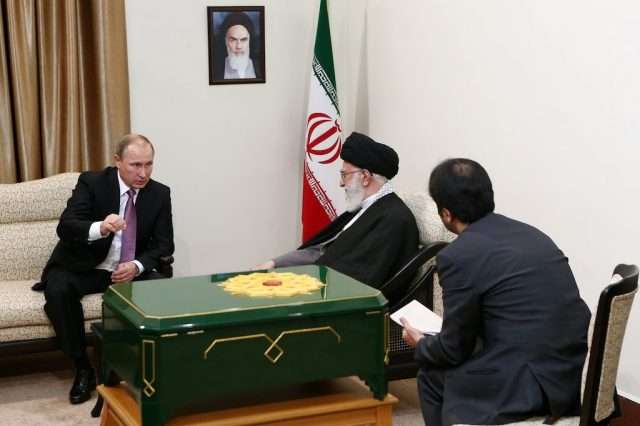
Geopolitical Report Volume 11 Issue 3
Author: Silvia Boltuc
Due to the U.S. sanctions, Iran has shifted its foreign policy looking for regional actors with whom to reach a new partnership. Therefore, in the last few years, we have witnessed increased cooperation between Tehran and Moscow in different fields.
Under President Ebrahim Raisi’s leadership, Tehran is preparing for a new foreign policy characterised by economic cooperation free from international interference.
In recent weeks, Iran took part in the Baghdad summit, which was attended by the Gulf monarchies and French President Emmanuel Macron, among others. The regional needs and the growing militarisation of Tehran could change the relations between the Islamic Republic and Saudi Arabia, with which negotiations on issues of common interest such as Yemen, Afghanistan and stability in the Persian Gulf, seem to continue unofficially.
Iraq plays not only a strategic geographic role, but the country has an unexpressed wealth. In fact, in recent days, the discovery of what could be the largest gas field on the continent has been announced.
Syria was absent from the negotiating table. The new Iranian foreign minister, Amir Abdollahian, has repeatedly expressed discontent with the choice of excluding the country, underlining that Syria is an essential neighbour for Iraq, a friendly and fraternal country indispensable for the stability of the country itself and the entire region.
According to experts, Iran’s foreign policy will change course under the new government, but there are several elements of continuity with the previous leadership.
As before, Iran confirms the idea that regional stability is exclusively the prerogative of local actors and categorically rejects interventions by foreign powers considered highly harmful. In this regard, Abdollahian reiterated that the new Iranian strategy aims to increase cooperation with the regional countries, especially Iran’s neighbours. This cooperation will focus not only on the geopolitical field but mostly on economic partnerships.
The cooperation initiated with Russia by the previous government will continue (Le relazioni Mosca-Teheran nello scacchiere geopolitico euroasiatico) as confirmed by the presence of an Iranian delegation led by the plenipotentiary ambassador of the Islamic Republic of Iran to the Russian Federation, Kazem Jalali, at the VIII International Forum for Technological Development “Technoprom-2021”. The ambassador met with Novosibirsk entrepreneurs, including the heads of large industrial companies. The region is the transit centre of Siberia and the scientific and technical capital of Russia. The governor of the region, Andrey Travnikov, and the ambassador have started a joint working group to develop cooperation plans.
Furthermore, Jalali’s claims that Iran is considering opening a Russian-language channel on national networks. Stressing how the ties between the two countries are growing, recently, Iran inaugurated the Goreh-Jask pipeline, built with some Russian investments (Analisi della pipeline Goreh-Jask nello scacchiere geopolitico iraniano).
Cooperation between the two countries regards both the economic and the geostrategic field. Moscow and Tehran enhance their cooperation thanks to a common adversary, the United States.
With Washington declaring that America is ready to turn to other options with the help of Tel Aviv if diplomacy does not resolve the Iranian nuclear crisis, Moscow could represent a valuable ally for Tehran.
A possible Russian-Iranian collaboration could also occur in the Afghan scenario. Iran’s position on the Taliban takeover is very diplomatic for the moment. The official statements are in support of the Afghan people regardless of who is in power. The Iranian foreign minister said Tehran supports an inclusive Afghan government involving all ethnic groups. Iranian spokesman Saeed Khatibzadeh announced the holding of the second round of inter-Afghan talks in Tehran because all the factions involved can take part. Although Iran is interested in defending Shiite minorities, the strategic needs have led the country to closer dialogue with the Taliban in recent months. As stated by Khatibzadeh, Iran will have to wait for the development of the Afghan crisis to decide which role to play and which powers to be considered allies in the Afghan scenario. However, Khatibzadeh points out that the Taliban are part of Afghanistan and the country’s future.
Collaborations between Moscow and Tehran are also expanding on the tourist and commercial sectors. The Iranian Minister of Cultural Heritage, Tourism and Crafts, Ali Asghar Munesyan, and the head of the Russian Tourism Agency, Zarina Doguzova, have signed an agreement to abolish the need for a visa for group tours aiming to attract 100,000 Russian travellers to Iran by 2023. The further extension of visa easing already anticipated from 2016 plans to facilitate, in addition to tourism, also travel for traders and entrepreneurs. Moscow and Tehran are also working on additional policies regarding heavy vehicles entering and leaving the country.
Iran would also be interested in initiating similar policies with Turkey, China and Germany, essential country’s trading partners. As confirmed by the Eurostat data, Berlin is Tehran’s leading one in Europe.
Conclusion
Raisi’s government is preparing to face many complex challenges. At the top of the political agenda, there is undoubtedly growing internal discontent and a severe economic crisis. Iran continues its anti-US policy on the foreign front and aims at a more stringent regional collaboration while respecting its legitimate interests.
The recent summit in Baghdad and the growing militarisation of the country would seem to push some critical antagonists of Tehran, such as Riyadh, to a normalisation of relations. A renewed cooperation between these actors could result in a balance shift between the countries of the Abrahamic pact and in a changed scenario in Yemen, even though the conflict has not yet stopped.
The new leadership has placed particular emphasis on economic cooperation. Iran firmly wants to keep the country’s trade choices, ballistic issues and neighbouring Arab states out of the nuclear negotiations.
With a view to greater decision-making independence, some oil exports have been cautiously resumed. Work is being done to further cement trade relations with essential strategic partners such as Moscow and Berlin with possible changed alliances with the post-Soviet republics of the Caucasus and Central Asia.
Author: Silvia Boltuc



